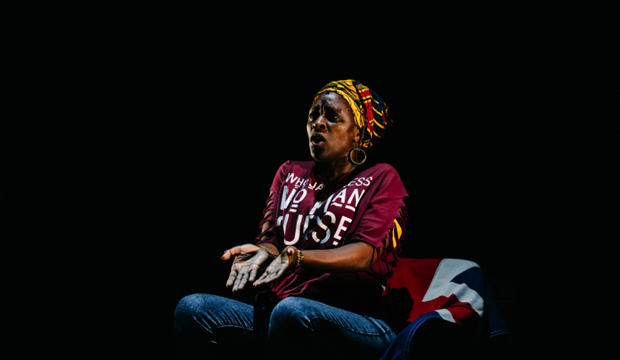Death of England: Closing Time review ★★★★★
Sharon Duncan-Brewster & Hayley Squires in Death of England: Closing Time at the National Theatre. Photo: © Feruza Afewerki
Until Closing Time, Death of England had looked at pressing questions such as race and identity in modern England, through the eyes of men: white, working-class Michael mourning the death of his racist father, and Delroy, the black boyfriend of Michael’s sister Carly, whose chaotic life prevents him attending the birth of their daughter.
In the fourth instalment of Roy Williams and Clint Dyer’s state of the nation series, it’s the women who step onto the Dorfman Theatre’s cruciform stage, the bright red of which evokes the England flag (set and costumes by Sadeysa Greenaway-Bailey and ULTZ).
Carly and Delroy’s mother, Denise, are winding up their failed business: a joint flower shop, Carly’s inheritance from her father, and Jamaican café, which consumed all of Denise’s savings.
As both women try to cope with the pain of failure, so underlying resentments explode spectacularly. Race is never far away, of course: for all that Carly claims she is not a racist like her Sun-reading father, her genuine love for a black man does not wash away deep-rooted preconceptions and casual racism.
Denise, for her part, carries the bitterness of those who are always at the receiving end of racism, those for whom life is always an obstacle course, who, in her words ‘are always having to start from the beginning.’ She is deeply conflicted when it comes to Carly: despite herself, she rather likes her son's spunky girlfriend, but she resents the intimacy with a white woman which being Carly’s ‘mother-in-sin’ involves.

Sharon Duncan-Brewster in Death of England: Closing Time at the National Theatre. Photo: © Feruza Afewerki
The confrontations between the two women give the playwrights the pretext to comment on many burning issues beyond the ever-present race: Covid, vaccines, the Royal Family, Ukrainian women, refugees, slavery, colonialism, Brexit, the murder of George Floyd… you name it, Williams and Dyer throw it at their characters.
The result is that Death of England: Closing Time is a mess. A glorious mess, containing some brilliant sequences, but a mess nonetheless, and at two-and-a-half hours an overlong one.
Roy Williams has always had a keen ear for dialogue, and while large sections of this play are hugely enjoyable, with sharp life-like observations and wicked humour, others feel implausible, less dialogue and more diatribe.Judicious editing would improve it immeasurably.
What is not in question is the quality of the interpretations, requiring tour-de-force acting from both protagonists. Stepping in at very short notice to replace an ailing colleague, Sharon Duncan-Brewster fully inhabits a complex, very human Denise: simultaneously strong and vulnerable, bitter but resilient, and sharply humorous. Brava.
Hayley Squires’s Carly, too, is a flesh-and-blood character, confused, fallible but redeemed by her love for a man she’ll never be able fully to understand and for the daughter she doesn’t even know how to define any more: ‘mixed heritage? Global majority?’

Hayley Squires in Death of England: Closing Time at the National Theatre. Photo: © Feruza Afewerki
Clint Dyer directs with flair and urgency; Benjamin Grant and Peter Malkin’s inspired sound design and Jackie Shemesh’s lighting creating a powerful atmosphere without being intrusive.
In the fourth instalment of Roy Williams and Clint Dyer’s state of the nation series, it’s the women who step onto the Dorfman Theatre’s cruciform stage, the bright red of which evokes the England flag (set and costumes by Sadeysa Greenaway-Bailey and ULTZ).
Carly and Delroy’s mother, Denise, are winding up their failed business: a joint flower shop, Carly’s inheritance from her father, and Jamaican café, which consumed all of Denise’s savings.
As both women try to cope with the pain of failure, so underlying resentments explode spectacularly. Race is never far away, of course: for all that Carly claims she is not a racist like her Sun-reading father, her genuine love for a black man does not wash away deep-rooted preconceptions and casual racism.
Denise, for her part, carries the bitterness of those who are always at the receiving end of racism, those for whom life is always an obstacle course, who, in her words ‘are always having to start from the beginning.’ She is deeply conflicted when it comes to Carly: despite herself, she rather likes her son's spunky girlfriend, but she resents the intimacy with a white woman which being Carly’s ‘mother-in-sin’ involves.

Sharon Duncan-Brewster in Death of England: Closing Time at the National Theatre. Photo: © Feruza Afewerki
The confrontations between the two women give the playwrights the pretext to comment on many burning issues beyond the ever-present race: Covid, vaccines, the Royal Family, Ukrainian women, refugees, slavery, colonialism, Brexit, the murder of George Floyd… you name it, Williams and Dyer throw it at their characters.
The result is that Death of England: Closing Time is a mess. A glorious mess, containing some brilliant sequences, but a mess nonetheless, and at two-and-a-half hours an overlong one.
Roy Williams has always had a keen ear for dialogue, and while large sections of this play are hugely enjoyable, with sharp life-like observations and wicked humour, others feel implausible, less dialogue and more diatribe.Judicious editing would improve it immeasurably.
What is not in question is the quality of the interpretations, requiring tour-de-force acting from both protagonists. Stepping in at very short notice to replace an ailing colleague, Sharon Duncan-Brewster fully inhabits a complex, very human Denise: simultaneously strong and vulnerable, bitter but resilient, and sharply humorous. Brava.
Hayley Squires’s Carly, too, is a flesh-and-blood character, confused, fallible but redeemed by her love for a man she’ll never be able fully to understand and for the daughter she doesn’t even know how to define any more: ‘mixed heritage? Global majority?’

Hayley Squires in Death of England: Closing Time at the National Theatre. Photo: © Feruza Afewerki
Clint Dyer directs with flair and urgency; Benjamin Grant and Peter Malkin’s inspired sound design and Jackie Shemesh’s lighting creating a powerful atmosphere without being intrusive.
TRY CULTURE WHISPER
Receive free tickets & insider tips to unlock the best of London — direct to your inbox
| What | Death of England: Closing Time review |
| Where | National Theatre, South Bank, London, SE1 9PX | MAP |
| Nearest tube | Waterloo (underground) |
| When |
07 Oct 23 – 11 Nov 23, 20:00 Wed & Sat mats at 15:00 Dur.: 2 hours 30 mins inc one interval |
| Price | £20-£60 |
| Website | Click here to book |